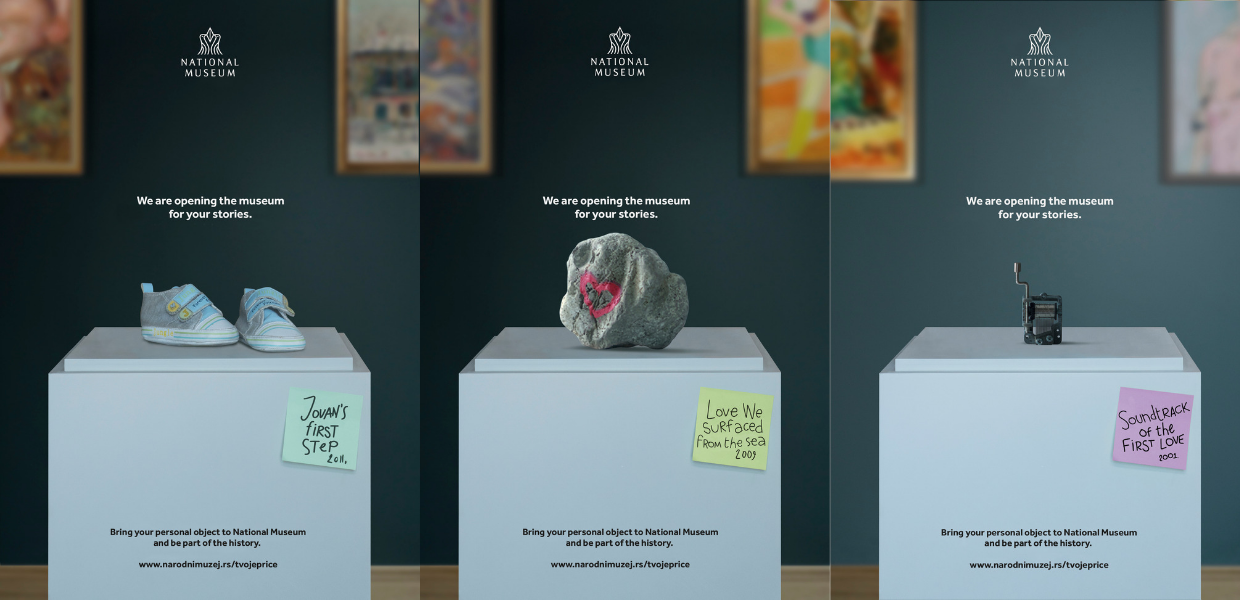National Museum of Serbia
Located in Belgrade, the museum has had a tumultuous history. It remained closed for 15 years due to renovations and organisational changes. Since its grand reopening in summer 2018, the museum has joined forces with GIFT consortium members NextGame, a Belgrade-based company specialising in playful projects and digital advertising, to develop digital solutions to modernise the exhibition of its eclectic collection of local archaeological findings, natural history and fine art.
Creating Your Stories
The experience was created over a 6-month period, involving close collaboration between museum employees and NextGame. The first step of the process included a public call inviting visitors to come to the museum with objects that they considered meaningful. A total of 25 visitors brought a variety of items such as clothing, military mementos, children’s toys and much more. Each piece was carefully 3D-scanned and visitors shared their personal stories about why their specific item should be immortalised in the museum.
Incorporating visitor content in the museum
After the first stage, museum curators and NextGame spent months carefully matching the digitally scanned items to the physical artefacts on display in the museum. The idea behind Your Stories was to show the everyday, human part of history. While the artefacts in display cases may seem distant and belonging to an era which we can’t relate to, at the same time they tell the story of our ancestors who perhaps weren’t as different from us as we think. Creating a narrative connecting the past and the present was the most important part of the process. For example, an exhibit on children’s toys dating from early human history was matched with a cosy toy added to the collection by one of the visitors - the favourite possession of their own child. It illustrated how everything we now treat as cultural heritage has once belonged to someone and has been a part of their lives, just as everyday objects that are meaningful to us now may one day become history themselves to our grandchildren.
Using the ARTcodes app
The experience is enabled through the ARTcodes technology introduced by my colleagues in previous articles about the GIFT project. ARTcodes are an artistic and creative way of tagging digital content, which can then be explored via an app. Every scanned object has been assigned a custom-made artcode, which upon scanning via smartphone leads visitors to the digital 3D model of the personal object as well as the short story of the person who brought it in. The simplicity and aesthetic value of ARTcodes were a good match to the needs of the curators, since introducing them to museum spaces is a highly customisable process and doesn’t disrupt the experience of visitors who prefer not to use technology during their stay. It was an important consideration based on experiences within the GIFT project, which highlighted how vital it is to give the museum staff agency and control, as well as to include them closely in the development process.
The ARTcodes application has been successfully launched and tested, and Your Stories remains an ongoing part of the museum’s permanent exhibition. The results are in line with the strategic goals of the museum: the development process as well as the experience itself has helped curators show the collection in a new light while allowing visitors a more meaningful interaction with the objects. As expressed by one of museum managers, 'Your Stories provokes (the audience) to have their own opinion. We want to develop the audience to be active, not just passive visitors who receive our stories, but to motivate them to communicate, and to have their own attitude, impressions, emotions and way of thinking.'
If you would like to know more, you can visit the museum to test it yourself or check out the website.
Find out more
To read more about how the GIFT project is giving museum visitors a chance to engage more deeply with collections through a variety of tools, check out the other articles in our GIFT news series. If you’d like to hear more about the research underpinning them and the project so far - and to test out the tools firsthand book your ticket to Europeana 2019 and attend the GIFT sessions on 27 November 2019.


